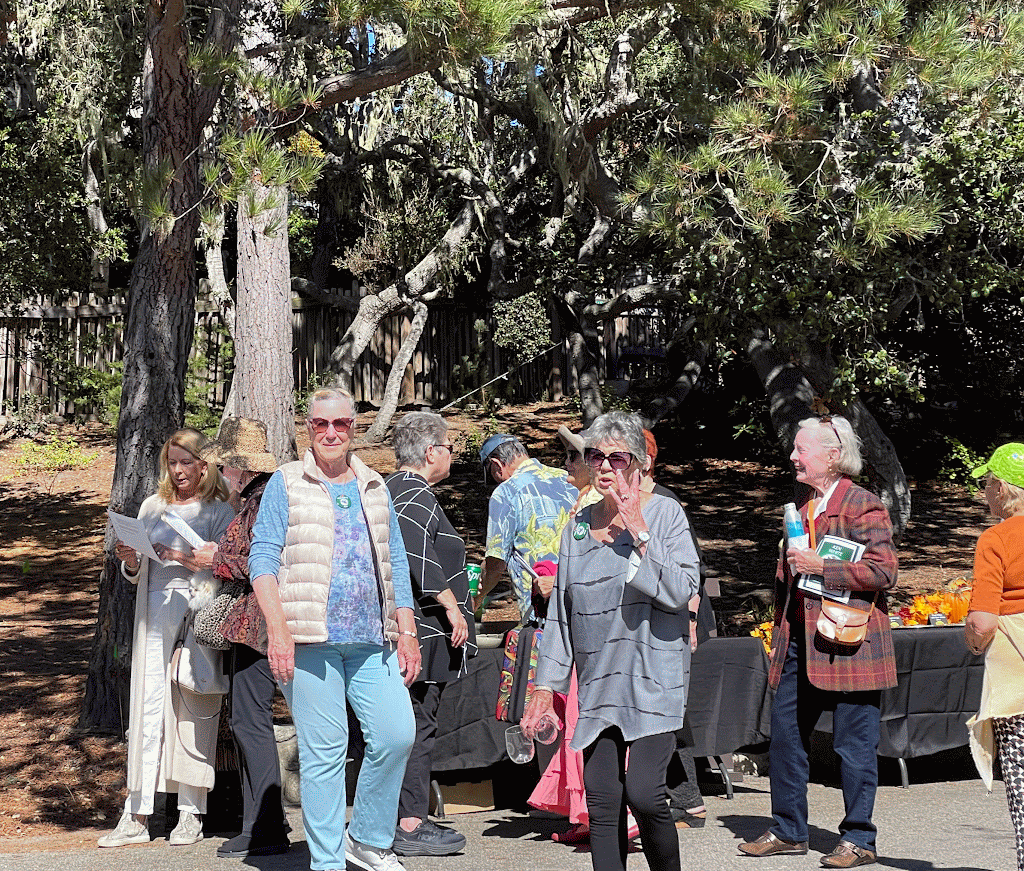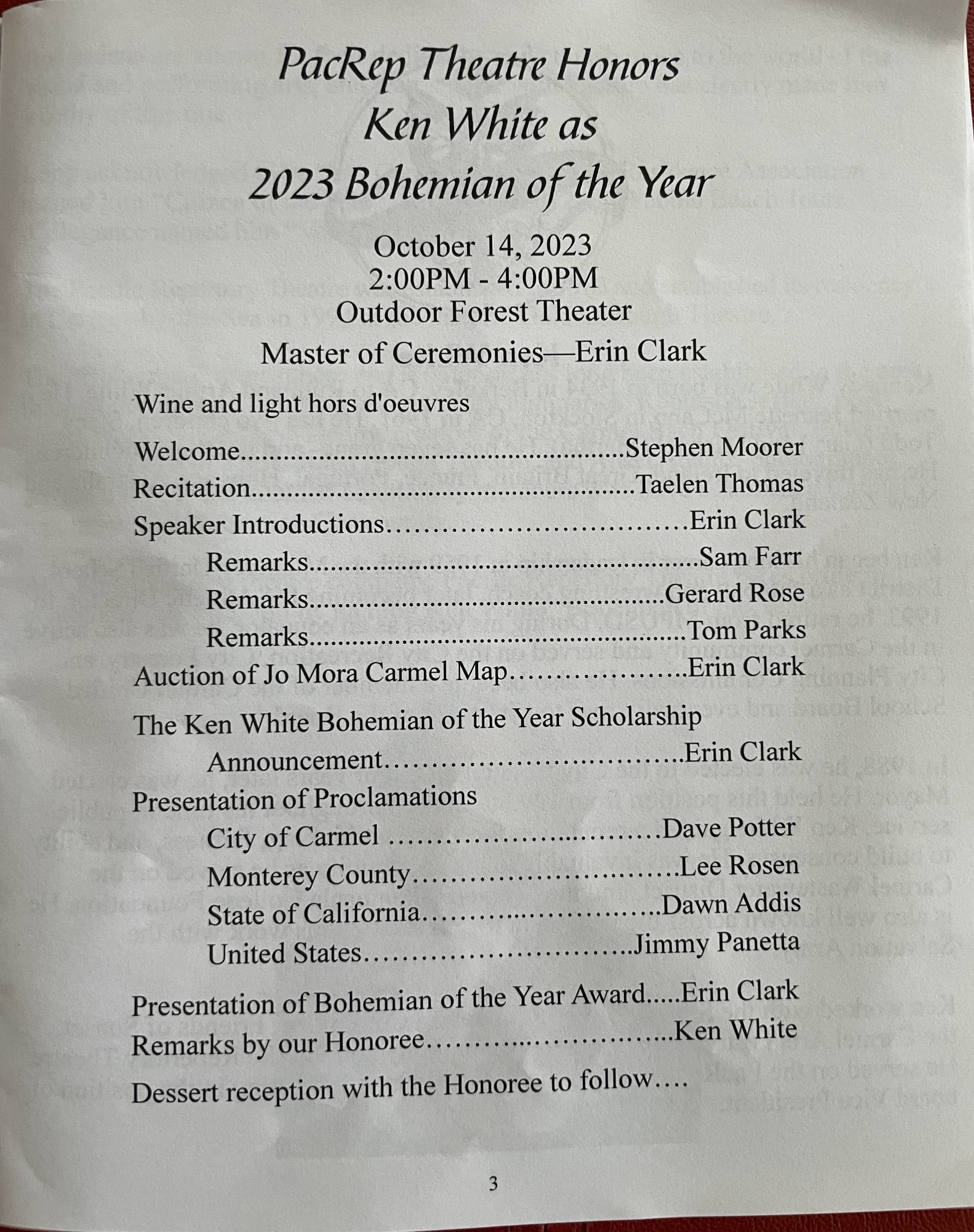
The Carmel Pine Cone issue 10/13/2023 Carmel declared war on the city of Napa; it eded in sour grapes
In the late 1990s, during Carmel Mayor Ken White’s second term, his secretary showed him an article in the San Jose Mercury News about an offer from iconic winemaker Robert Mondavi and his wife to underwrite a wine, food and arts center to benefit the City of Napa. During the approval hearing before the Napa City Council, the vice mayor cast a lone dissenting vote and defended his decision by saying, “We don’t want to Carmelize Napa.”
That didn’t sit well with Mayor White. After some thought and discussion with staff, he declared, “We’re going to write a letter to the mayor and city council of Napa saying, ‘You have besmirched our reputationimmeasurably; you have denigrated and insulted us. We hereby declare war on the City of Napa. Owing to the fact your city is much larger than Carmel, we wish to surrender immediately, but demand the following reparations: Two cases of Mondavi Cabernet Sauvignon Reserve and two cases of Mondavi/Rothschild’s renowned Opus One.’” More of this war story a little farther on.
White was born in Berkeley, where his father worked in the shipyards in the run-up to World War II. The family soon moved to Fair Oaks, to an two-story Victorian with 15 acres of olive and orange trees.
“At the start of the war, representatives of the Defense Department knocked on our door and said they were buying our entire crop of olives and oranges for the duration of the war. That’s where I grew up, working on the ranch,” said White.
Lighting a fuse
He graduated from Sacramento’s San Juan High School and attended what is now Sierra College for two years. Much to his surprise — and his family’s — he made grades worthy of the dean’s list.
“I was not a great student, but I had a couple of professors who were terrific and they lit a fuse." he said. That led to his passionate belief in California’s community college system. White transferred to Chico State, playing baseball there for two years. His football career ended with an early season knee injury. He completed a BS degree, then a master’s in physical education and life science.
“Along the way, I realized working with young people and coaching was what I wanted my life to be about,” he said.
In 1959, White accepted a position at Monterey High School teaching biology and coaching football and wrestling, soon becoming director of athletics. The school’s fledgling wrestling program evolved into one of the most successful athletic dynasties on the Monterey Peninsula and ignited interest in the sport throughout the county
White believed in the wrestling's confidence-building powers to deal with what happens on the mat and in life. He added, “I’ve always enjoyed team-building — pulling a group of people together and watching them improve.”
Bringing people together has been a continuing theme in White’s life, attested to by his 33 years at Monterey High School and myriad community service activities, organizational chairmanships, volunteer work and participation in local government.
He was school board chairman for Carmel Unified School District and a member of the city planning commission, was elected to the city council and served eight years as Carmel’s mayor. He also served eight years on the board of Pacific Repertory Theatre and was board president of the Monterey County Pops, among many others. In 2008, White was recognized as Citizen of the Year by the Carmel Residents Association and in 2023 received the United Way’s Lifetime of Service Award.
In 1986, Mayor Clint Eastwood fired White and the other six members of the planning commission. Eastwood then proposed six new members and reappointed White.
“I was dumbfounded,” White said. “I went home and told my wife Jean, "I got fired and hired all within minutes" Two nights later I’m in the living room with a glass of wine, reading the paper, when the telephone rang. Jean picked it up in the kitchen and I hear, ‘Hello … Clint? Clint who?’ I rushed to the kitchen, whispering ‘Gimme the phone, gimme the phone.’ I said, ‘Hi Clint. How’s it going? What can I do for you?’”
“Well Ken,” Eastwood said. “I want you to chair the planning commission for me.”
World-class venue
White told how he met Jean. “When I was at Chico State, I was in the balcony of the Senator Theatre one evening and recognized one of the girls sitting in front of me from my college dance class,” he recalled.
At intermission, he introduced himself, began a conversation, and before the start of the second feature, employed one of the English language’s classic romantic gambits, “Would you like to go bowling?” It worked.
He and Jean were married in 1961 and raised their family in the 1910 home built by his great-aunt and great-uncle - a member of Carmel's first City council - a block from La Playa Hotel.
During White’s three-year tenure on city council, he formed a group to study the need for renovation of Sunset Center to upgrade it to a world-class performing venue, then later moved to make it happen. As mayor, he was active in the public-private partnership that raised funds for the project.
The city contributed $9 million and a citizen’s group headed by Bill and Nancy Doolittle raised an additional $13 million.
White’s dedication to worthy causes and to getting things done, along with his zest for life, were mirrored in Jean, who died in 2022.
“She was a solid human being who thought about things carefully” he said, noting that “she was a builder of people,” who started the Friends of Sunset Foundation to augment its inadequate budget.
Jean also helped pioneer the modern version of “natural childbirth" on the Penninsula after researching its benefits to newborn babies.
“We matched up perfectly,” White added.
The couple’s wide-ranging list of accomplishments, together and individually, is impressive.
Pacific Reperatory Theatre is honoring White with its annual Bohemian of the Year Award on Saturday at the Forest Theater, recognizing his considerable contributions to the arts community.
Bud Light
Now, back to the Battle of Napa. Two weeks after sending the declaration of war and demanding reparations, White received the following reply from Napa’s mayor: “Mayor White, your demand for two cases of Mondavi cabernet sauvignon and two cases of Opus One would be a severe strain on our budget, but we do understand your concerns. Our vice mayor has offered the following compromise: he suggests we send a case of Bud Light.”
Regardless, two weeks later, a UPS truck pulled up in front of Carmel City Hall with the requested wines. There was no word on how the revenue was raised to support the gift.
White received a letter the following day from Robert Mondavi and his wife, Margrit, expressing how much they enjoyed their visits here, that they loved Carmel-by-theSea and hoped no hard feelings had occurred between the two cities.
At the annual “coming together” dinner honoring city council members, commissioners, volunteers and spouses, all but a few were surprised to learn they were the beneficiaries of the hard-won war reparations negotiated by White, Robert Mondavi and the City of Napa.
~~~ End ~~~
|



